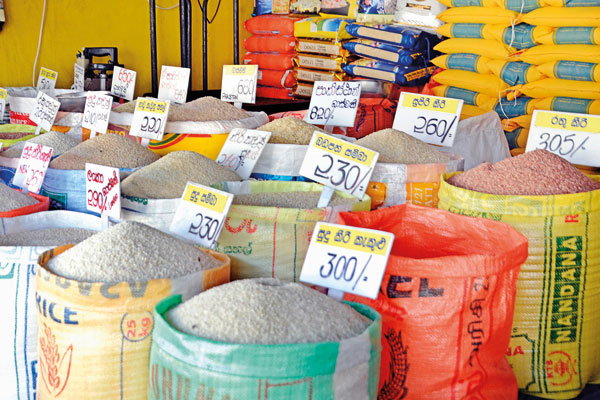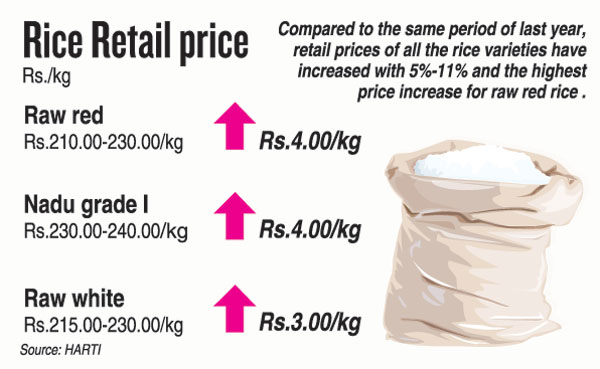News
No quick fix for price of staple amid claims of artificial shortage
View(s):By Kasun Warakapitiya and S. Rubatheesan
The Government is battling to control the escalating price of rice as traders overlook the maximum retail price.
According to the weekly food commodities bulletin published by the Hector Kobbekaduwa Agrarian Research and Training Institute (HARTI) for October 18-24, rice varieties are being sold above the maximum retail price.
After a meeting last week, officials began checking large, medium and small scale rice mills as well as paddy storages.
The new government, grappling the issue for a third consecutive week, is trying to get the complete picture of paddy stock.
The Consumer Affairs Authority (CAA) is gathering data on paddy stocks in the hands of millers and in storages.

Compared with the same period of last year, the price of all local rice varieties has increased by 8% to 20%, while the price of Keeri samba has dropped by 14%. Pic by Priyanka Samaraweera
CAA Director General Thilakaratne Banda, told the Sunday Times that as of Friday, paddy data of only five districts have been collected. The information has been handed over to the Ministry of Trade, Commerce and Food Security as directed by President Anura Kumara Dissanayake.
According to Mr. Banda leave has been cancelled and officers were told to collect the remaining data at the weekend and prepare a report by Monday.
A senior CAA official told the Sunday Times that a report will take time. According to him, analysis is needed on computerised stock records of many large scale mills.
Some rice varieties are in short supply.
Retailers too, are deliberately purchasing high priced varieties as millers had placed conditions that they would only provide varieties that are in short supply only if they purchase more of the high priced rice.
But, due to price controls, vendors are not buying high priced rice varieties as they are unable to maintain a profit margin.
According to the HARTI food commodities bulletin, the price of Red Nadu grade I increased by Rs 4, while the price of raw white increased by Rs 3 in the week.
The price of Nadu grade I, Nadu grade II, raw red and raw white has increased by 1-3% due to unavailability of sufficient stock.
A kilo of Nadu rice (grade I) ranges between Rs.220 and Rs 230 while grade (II) is sold for Rs 215 to Rs 220 per kilo. Red raw rice sells for between Rs 205 and Rs 212 per kilo, while white raw rice is between Rs 208 and Rs 215, the report noted.
Keeri samba price ranges from Rs.118 to Rs 132 per kilo in the main producing areas. The highest average price of keeri samba paddy is reported at Rs.131 per kilo in Polonnaruwa, the report found.
Compared with the same period of last year, the price of all local rice varieties has increased by 8% to 20%, while the price of Keeri samba has dropped by 14%.
The average farmgate price of main paddy varieties has also varied marginally over the previous week, the report indicated. The average price of short grain (Samba) has increased by Rs.1 and Rs 6 per kilo with the highest price increase reported in the Ampara region.

The small-scale millers said that the government cannot be expected to find immediate solutions. They admitted that big time millers and those who have storage, have stocked up paddy.
D.K. Ranjith, chairman of the Maradagahamulla rice producers association, said the CAA has collected details of their paddy stocks and storage capacity Storage is not enough, he said.
The price paid for paddy will have to drop, he said.
Mr. Ranjith added that big time millers have slowed down production and artificially created a rice shortage knowing that there are no stocks in government hands.
The government should either import, allow the prices to remain the same until a mechanism is set up to control prices by the next harvest season, or reduce paddy prices. There is no other way to reduce the shortage, he said.
If the government had a buffer stock of paddy it could have been milled and converted to rice, he said.
The large-scale millers, when contacted by the Sunday Times, said that they would respond later.
Muththu Sivamohan, the secretary of Iranamadu Farmers Federation in Kilinochchi told the Sunday Times that while he appreciates the move by President Anura Kumara Dissanayake to halt rice imports, the government must give priority to consumers. “There has to be an effective policy when it comes to rice prices considering the grassroots level.’’
Mahinda Amaraweera, former agriculture minister, said maintaining buffer stocks is essential for controlling prices, but during his tenure, efforts by the Paddy Marketing Board to buy paddy failed because the Treasury did not provide funds.
He claimed he advised ministry officials to take control of the situation of rising prices.

After a meeting last week, officials began checking large, medium and small scale rice mills as well as paddy storages
| Price of rice often fluctuates with harvest seasonsDespite ad hoc measures by various governments, the price of rice fluctuates with every Yala and Maha harvest seasons in Sri Lanka. State institutional inefficiencies and corruption under agriculture and trade ministers, also contribute, along with oligopolies with political power. About 200 plus of the largest rice millers are estimated to process more than 30% of the rice.Data show that the price of rice often rises in September and peaks in the festive period. At the Maha harvest time, the price touches a low in March, and at Yala harvest the price eases in July and August. The Consumer Affairs Authority has not been able to curtail anti-competitive practices in the market and the Paddy Marketing Board languishes in the economic and political wilderness. In 2020-2021 Yala, the board, whose 2023 financial loss exceeds Rs 1 billion, only bought a mere 24,000 plus metric tonnes from farmers, regardless of its mandate, records show. The past year, it was denied funds. PMB, which is mandated to record data of paddy supply and storage, often borrows to buy paddy and owes more than Rs 22 billion to state banks. As of June, PMB has an outstanding Treasury guarantee of Rs 363.2 million. -KB | |
The best way to say that you found the home of your dreams is by finding it on Hitad.lk. We have listings for apartments for sale or rent in Sri Lanka, no matter what locale you're looking for! Whether you live in Colombo, Galle, Kandy, Matara, Jaffna and more - we've got them all!

